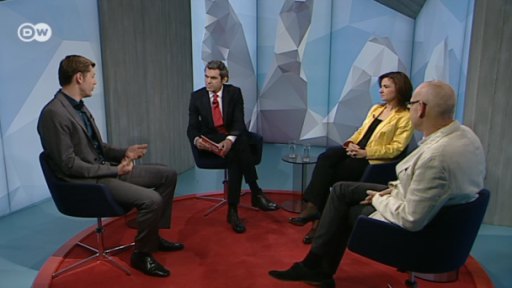Quadriga - Turkey and the IS – Erdogan’s Double Game

This browser does not support the video element.
So far, Turkey has refused to allow the US to use military bases in Turkey for air strikes against the IS. The campaign by the US-led coalition, which includes several Arab nations, has had little success. Erdogan has rejected calls for a safe corridor enabling Kurds to supply arms, fighters and humanitarian aid to Kobani.
For the Kurds, Ankara's policies are part of the problem in the conflict with the IS In the past week dozens have died in anti-government protests by Kurdish groups in Turkey. Compounding the situation, there has been fighting between the Turkish military and the outlawed Kurdistan Workers' Party (PKK) for the first time since the start of an 18-month truce.
Erdogan is unwilling for Turkey to send ground troops into Syria on its own, calling instead for joint efforts by NATO. Are the Kurds the pawns in a power game involving Turkey, NATO and the US-led anti-IS coalition? And how reliable a NATO partner is Turkey?
Tell us what you think. Send an email to quadriga(at)dw.de
Turkey and the IS - Erdogan's Double Game
Our guests:
Günter Seufert- worked as a freelance author and journalist in Istanbulfor several years, before joining the German Institute for International and Security Affairs in Berlin. He also worked as a researcher and lecturer at the Universityof Cyprus, the German Oriental Institute in Istanbuland at the Universityof Lausannein France. He is specialized in Turkish domestic and foreign policies.
Daniel Gerlach– He is the founder and editor-in-chief of Zenith, a German magazine focusing on politics, economics and culture in the Middle East. After studying history and Middle Eastern Studies in Hamburg and Paris, he started as a freelance journalist. He is the author for several TV-documentations on the Middle east and the Islamic world. He is also a co-founder of the German publishing house Levante Verlag.
Bilgin Ayata– is an assistant professor of international relations at Berlin’s Free University. In her research she deals with migration, ethnic conflict, transnational activism, and politics of memory. Her regional focus encompasses the Middle East, North Africa and Europe, in particular Turkey and the Kurdish conflict.